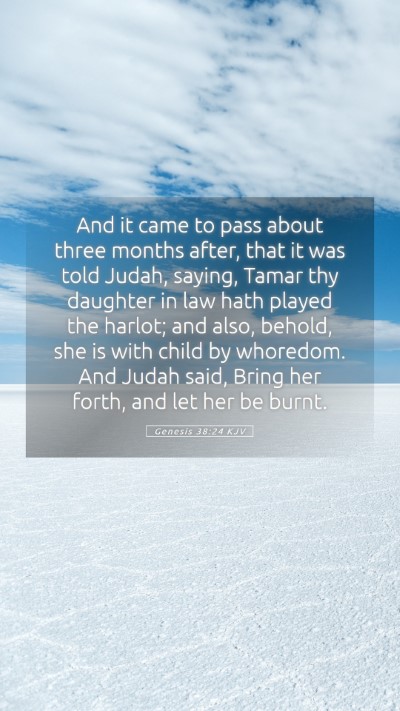Understanding Genesis 38:24
Genesis 38:24 states: "And it came to pass, about three months after, that it was told Judah, saying, Tamar thy daughter-in-law hath played the harlot; and also, behold, she is with child by whoredom. And Judah said, Bring her forth, and let her be burnt."
Bible Verse Meanings
This verse is a critical point in the narrative of Judah and Tamar. It's significant in illustrating themes of morality, judgment, and the unfolding plan of God. The incident highlights the consequences of Judah’s family dynamics and the urgent attention to righteousness in biblical history.
Bible Verse Interpretations
- Matthew Henry's Commentary: Henry emphasizes the cultural context in which Judah, upon hearing of Tamar's supposed infidelity, quickly seeks to enact punishment. This reflects the patriarchal legalistic tendencies of the time while portraying Judah’s hypocrisy since he himself acted immorally.
- Albert Barnes' Notes: Barnes points out that this situation serves as a precursor to the events that would lead to the establishment of the lineage of David. He notes that Judah's initial reaction is harsh, illustrating the flaws in human judgment and the importance of mercy.
- Adam Clarke's Commentary: Clarke discusses the broader social implications of Tamar's situation. Her actions are a desperate attempt to secure her rights and legacy within a culture where women were often powerless, revealing a complex interplay of righteousness and wrong.
Bible Verse Understanding
The message in Genesis 38:24 is profound. It challenges readers to consider the complexity of human behavior, societal norms, and divine purpose. The verse is not simply a narrative but a rich source for biblical exegesis, indicating God’s sovereignty even amid human failures.
Bible Verse Explanations
To explain this verse, one must look at its implications for personal conduct and community ethics. In a broader theological sense, it prompts reflections on grace, judgment, and the ways in which God can work through flawed human actions to bring about His plan.
Scripture Analysis
The events leading to this moment are instrumental in understanding the lineage of Christ, as Tamar is ultimately featured in the genealogy of Jesus (Matthew 1:3). The juxtaposition of Judah's judgment and Tamar’s actions invites analysis of justice and redemption in biblical terms.
Biblical Exegesis
Exegesis of this passage reveals significant underlying tensions—between law and mercy and between personal failure and divine grace. It urges reflection on how individuals navigate these tensions in their own lives and communities.
Bible Study Insights
For Bible study groups, this passage serves as a discussion starter on themes of righteousness, societal expectations, and God's redemptive work. The harsh judgment from Judah contrasts with later revelations of mercy, making it an impactful lesson for personal growth and community ethics.
Related Bible Cross References
- Matthew 1:3 - The genealogy of Christ, highlighting Tamar's role.
- Genesis 38:1-10 - Context of Judah’s family and Tamar’s story.
- Deuteronomy 22:21 - Law regarding sexual immorality in ancient Israel.
- Hebrews 11:31 - Reference to Rahab's faith, often juxtaposed with Tamar’s actions.
- Ruth 4:12 - Mention of Tamar in the lineage leading to David.
Conclusion
Genesis 38:24 serves as a reminder of the complexities of human relationships and the nature of God’s justice and mercy. It invites further exploration of how such ancient stories resonate with contemporary issues of morality and identity.


